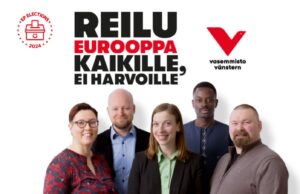
Czech Republic’s EP Elections are seen as insignificant and often deemed less important than domestic ones. Local issues dominate, overshadowing European concerns. The Ukraine conflict may impact voter sentiment, with diminishing support for aid. The Czech left faces slim electoral prospects.
In collaboration with transform!’s initiative “Socialism for the 21st Century”, the Society for European Dialogue (SPED) has conducted a comprehensive analysis of the political landscape in the Czech Republic. Drawing from a range of sociological surveys and internal investigations, SPED has gathered crucial insights into the current political situation. Key findings from this research phase have been disseminated through left-wing media channels and shared with partner organisations. This analysis reflects the political climate as of March 2024.
The information provided offers insights into Czech attitudes towards the EU, European integration, and political dynamics ahead of the EP elections. Generally, research indicates a higher level of trust in “Europe” itself than in the EU as such. Consequently, Eurosceptics tend to outnumber Euro-optimists. This sentiment is mirrored in the composition of parties vying for seats in the EP. Interest among voters in this election tends to be low, hovering at around 30%. Notably, among left-wing forces, the STAČILO! (Enough) coalition emerges as a potential contender, currently garnering approximately 5% support. Comprising the Communist Party (CPBM: the Communist Party of Bohemia and Moravia) along with other left-wing and centrist parties such as United Democrats – Association of Independents, Czech National Social Party, and independent candidates, the coalition stands as a notable force in the political landscape.
Eurosceptics vs Euro-Optimists
In the upcoming EP elections, Eurosceptic parties in the Czech Republic outnumber Euro-optimist ones. Thirty candidates have thrown their hats into the euro-sceptic ring. Leading the pack are the ANO movement, the Together coalition, SPD, Trikolora, the STAN movement, and the Pirates, all with promising electoral prospects. Hovering near the five percent threshold are the coalitions of Oaths and Motorists, as well as STAČILO!, spearheaded by current MEP and CPBM chair, Kateřina Konečná. Overall, a common thread among various forces critical of the current establishment, despite their diversity, is the prioritisation of defending national interests and voicing criticism against “Brussels” (the EU system). This sentiment unites individuals who are discontent with “Fiala’s governance,” referring to the current centre-right coalition government, irrespective of their ideological leanings.
European Union membership isn’t deeply ingrained in Czech society; only a minority identify themselves as part of it. The European Union is viewed in the Czech Republic as a contentious entity with political connotations, often causing societal divisions. In contrast, “Europe” holds a more neutral connotation. Czechs tend to associate it with geographical or philosophical concepts and values, evoking a sense of historical pride. “Europe” doesn’t polarise Czech society to the same extent as the European Union, which inherently carries a political charge. It’s not simply seen in historical or geographical terms but also in light of its decision-making processes. For instance, activities related to the green transformation, such as the Green Deal, are closely tied in the Czech public discourse to how the European Union addresses them, encompassing both their achievements and potential risks.
Satisfaction with the EU witnessed a significant decline of 20 percentage points from 2005 to 2023, reaching down to 45%. Support for the introduction of the euro stands at 20% among respondents. In the hypothetical scenario of a referendum, 29% of the population would unequivocally vote to remain in the EU, while 30% would lean towards staying. Conversely, 22% would prefer to leave, and 20% would firmly opt to exit. Regarding the EP elections, 17% perceive them as definitely important, 27% as rather important, 31% as somewhat important, and 25% as unimportant.
Typology of Citizens’ Attitudes Towards the EU and Ep Elections
As previously mentioned, the largest segment of citizens can be categorised as 21% moderate supporters, 21% undecided, and 24% opposed. Twenty years post-accession, citizens exhibit significant awareness of the diverse risks associated with the European Union. Simultaneously, they recognise its benefits. Despite a limited understanding of the EU among the Czech public, there remains a prevailing sentiment in favour of continued participation within it.
In the long term, the attitude of the Czech population towards European integration has been lukewarm. It is cautious about incoming proposals and has so far not been very interested in the EP elections. Currently, approximately one third of voters declare their intention to participate in the upcoming EP elections, but the actual result will be lower.
Candidates and Their Programme Orientation
Apart from STAN and the Pirates, the orientation of all parties is predominantly Eurosceptic, aligning with the generally critical and reserved positions held by the majority of voters. These reservations can be summarised in a few key points. Foremost among them are the bureaucratic measures necessitated by the European Union. Following closely are concerns regarding energy and food prices, agricultural policy, particularly in relation to the Green Deal. However, there is a reluctance among parties to engage in discussions about the necessity of bolstering the EU’s social dimension to ensure that climate protection measures do not disproportionately burden ordinary households. Another pressing issue is migration, which remains unresolved within the EU. There have been repeated calls for migrant issues to be addressed before individuals cross into the European Union, emphasising the need for asylum procedures to occur outside the Union, in third countries. Additionally, the ongoing digitalisation and militarisation of the EU raise concerns about the restriction of freedom of speech, limitations on media freedom, and the propagation of fear in society. These issues significantly impact public sentiment and bolster support for national conservative aspirations and ideas. Politicians from the most prominent parties and political movements (including the ruling ones) in the Czech Parliament are increasingly voicing criticism of the European Commission’s policies and advocating for EU reform.
The SPOLU coalition is behaving in a somewhat hypocritical manner, as it criticises the EU in many ways, while the government itself conforms to the EU. In December 2023, the Prime Minister of the ODS, Petr Fiala, who has long been steadfast in his support for aid to Ukraine, was characterised as the least popular democratic leader. The image of the government has not improved much since then. On the contrary, according to the latest opinion poll, just 2% of the Czech population trust the government and another 18% only “rather” trust it. 80% of the public said otherwise. The leaders of the two opposition parties in the Chamber of Deputies of the Czech Republic, Babiš (ANO 2011) and Okamura (SPD), are more than twice as popular as the Prime Minister. The current situation suggests that the EP elections may be a kind of referendum on the current government.
The assessment of various decisions extends beyond mere opinions on the EU and the social landscape in the Czech Republic. It primarily revolves around the challenges inherent in today’s capitalist framework, which significantly shape public behaviour and conformity to governing structures. This conformity originates from recurring daily practices, manifested in individual and social orientations and identities, largely driven by unrestrained resource exploitation, disproportionate strain on global and local ecosystems, and reliance on cheap labour from other regions. The outcome is an “imperial mode of living” (imperiale Lebensweise). The imperial way of life widens the gap that separates the workers of the global North from the workers of the global South, while the exploitation of the former has been undermined by the exploitation of the latter since Fordism.
The dominant leftist political forces in these elections tend to represent the patriotic/nationalist and Eurosceptic part of the population. The traditional “right-left” division is not well represented by these coalitions or the self-identification of citizens. Rather, capitalism during the coronavirus crisis was able to intervene in the economy in a previously unprecedented and fundamental way, favouring the “base economy” from which the infrastructure of everyday life derives. The response to the crisis has also provided a lasting lesson for the social and political left, which is to reject the policy of belt-tightening austerity, especially in a situation where the Czech Republic has one of the highest concentrations of wealth in Europe[1], as well as a persistent lag in real wages compared to the level before the coronavirus pandemic. The multiple crises that took place at the end of the first decade of the new millennium showed that the conservative, liberal and social democratic parties primarily represent the interests of the elite. Alongside the financial, ecological and financial crisis, the crisis of social reproduction, caused by impoverishment, the disintegration of society and cuts in the social safety net, is a reality.
It also includes the crisis of political representation of the established parties. In various European countries, liberalism is limited to a technocratic defence of the free market. Today’s technocracy under the guise of democracy represents a reduction of citizens to a workforce, statistical units, or electorate.
In the various strategic documents of international organisations such as the United Nations, as well as national governments, there are formulations that claim that the “greening” of the economy will create a social-ecological win-win situation. According to this view, the market and its efficiency play the most important role, the market is where innovation is developed, and then comes the role of the state, which sets the rules of the market and counteracts its “failures”. In the background, however, is the fact that the peasants and indigenous peoples of the regions where corporations acquire land often pay the price for the rules of the market. Green grabbing strategies, i.e. the expropriation of land for environmental purposes and the valorisation of ecosystem services and labour threaten the very conditions for nature conservation that they seek to create. Emissions trading is also problematic. If private individuals or companies are allowed to pay “indulgences” in the form of various compensations for the environmental damage caused by production, this may give the impression that nature is in principle replaceable. The use of a mix of agrofuels, subsidies for electric cars, the inclusion of air transport in the European Emissions Trading Scheme and other similar moves by “green capitalism” lead to the belief that the imperial way of life is sustainable precisely through modernisation.
The Impact of Slovakia and Its Political Situation on the European Elections in the Czech Republic
In the context of the atmosphere before the forthcoming EP elections, it is necessary to consider the recent presidential elections in the Slovak Republic, which have become not only a purely Slovak affair. The Czech public and private media, as well as politicians, have been closely monitoring Slovak political developments. Even before the first round of the elections, the government of Petr Fiala showed its attitude towards the presidential candidates by interrupting regular meetings between the representatives of the two countries at the level of the governments of the Czech Republic and Slovakia because of their different positions on certain foreign policy issues, especially military support for Ukraine. The chairman of the strongest Slovak opposition party, M. Šimečka, visited the Czech Republic and met with representatives of the Czech government. The Czech representatives expressed their support for the winner of the first round of the presidential elections, Ivan Korčok, a former Slovak foreign minister, the so-called “civic candidate” supported by the Slovak opposition. On the other hand, representatives of the Czech opposition, such as Andrej Babiš, as well as Miloš Zeman, the former President, supported from the outset the definitive winner of the presidential contest, Peter Pellegrini, the current Speaker of the Slovak Parliament and chairman of the Voice party, which is part of the coalition government led by Robert Fico, the chairman of the Smer party.
Notes on the Current Situation Ahead of the EP Elections
On the Czech left, multiple political currents have emerged to run candidate lists for the elections: the SOCDEM list (the Social Democratic Party is the base of it) is supplemented by some representatives of other entities (e.g. Budoucnost – “the Future movement”, the Council of Senior Citizens). This is considered a “pro-European” option. It is led by Lubomír Zaorálek, a former minister of many governments in which the Social Democratic Party participated.
The coalition STAČILO! — the base of which is the CPBM along with other other organisations and bodies of individuals of the “patriotic” left. Separate candidates are the Levice (The Left Party, a member of the Party of the European Left), and the Green Party — a “traditional” Green party in the European understanding, pro-European, pro-environment, — but they do not register in the polls at all. In the Czech political arena, the green party achieves a maximum of 1-2.5% support in Parliament. In total, 30 entities have submitted their lists of candidates, which is 10 less than in the last elections. The ruling coalition (5 member parties) is running as a coalition of SPOLU (3 member parties) and two separate parties (STAN and Pirates).
As far as pre-election coalitions are concerned, the most relevant ones are on the right (centre-right) of the political spectrum. The ANO movement, as a self-described “centrist” formation for “everyone”, is running independently (currently with about 35% support in the polls), as well as the (semi) populist SPD movement of Tomio Okamura (the most “anti-European” option, with about 10% support of the population)
Neither the manifesto of the European Left — the “European Elections Manifesto 2024” — nor the nomination of the “Spitzenkandidat” Walter Baier have made much of an impression in the Czech political environment. The Czech parties that are part of the EL (CPBM and Levice) do not work with the document or the candidate in public and therefore these documents are not known to the public.
Thematically, the campaign and the EP elections are seen primarily as a national issue and an expression of approval/disapproval of the government’s right-wing policies. European issues are mediated in the campaign as they are in domestic politics.
The campaign is starting very slowly, so far rather by presenting visual forms (billboards), and only a few TV discussions have taken place. The on-the-ground campaign so far focuses on smaller events with smaller numbers of participants and in smaller places/cities (here the leading candidate STAČILO!,. the chair of the CPBM – Kateřina Konečná, the current MEP, is very active and seems to be successful).
The dividing lines in the current Czech EP campaign are formed mainly in relation to the current government: support for the government/criticism of the government, in relation to the war in Ukraine; support for the war/search for peaceful solutions (this is often dismissed by propaganda as a “pro-Putin and pro-Russian position”), the economic situation and perspective; acceptance of the Green Deal versus criticism or rejection of it, etc. The right-left divide is far less visible in this way.
[1] The richest 20% of the population hold 80.5% of all net worth in the country, while the poorest 20% hold only 0.2%.



